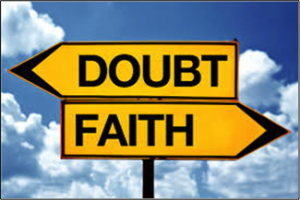
Pastor Rich Knight
Central Congregational Church
Oct. 20, 2019
John 20:19-31
This passage tells of the very first Easter Sunday. Sunday is called here, “The first day of the week.” In ancient days it was. People worked 6 days, rested on Saturday and went back to work on Sunday. Our calendars today still reflect this. Sunday begins the row on the left.
John 20:19 – 31
When it was evening on that day, the first day of the week, and the doors of the house where the disciples had met were locked for fear of the Jews, Jesus came and stood among them and said, “Peace be with you.” After he said this, he showed them his hands and his side. Then the disciples rejoiced when they saw the Lord. Jesus said to them again, “Peace be with you. As the Father has sent me, so I send you.” When he had said this, he breathed on them and said to them, “Receive the Holy Spirit. If you forgive the sins of any, they are forgiven them; if you retain the sins of any, they are retained.” But Thomas (who was called the Twin), one of the twelve, was not with them when Jesus came. So the other disciples told him, “We have seen the Lord.” But he said to them, “Unless I see the mark of the nails in his hands, and put my finger in the mark of the nails and my hand in his side, I will not believe.”
A week later his disciples were again in the house, and Thomas was with them. Although the doors were shut, Jesus came and stood among them and said, “Peace be with you.” Then he said to Thomas, “Put your finger here and see my hands. Reach out your hand and put it in my side. Do not doubt but believe.” Thomas answered him, “My Lord and my God!” Jesus said to him, “Have you believed because you have seen me? Blessed are those who have not seen and yet have come to believe.”
Now Jesus did many other signs in the presence of his disciples, which are not written in this book. But these are written so that you may come to believe that Jesus is the Messiah, the Son of God, and that through believing you may have life in his name.
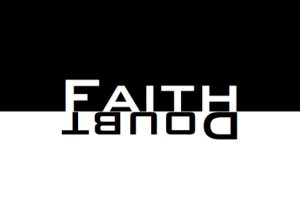
I’ve often thought of Doubting Thomas as the Bill Buckner of Christianity.
Buckner, of course, made one little mistake – one little ground ball goes through his leg (and one of those legs was badly hurt and he shouldn’t have even been out there that late in the game! However, I digress.) Buckner had an outstanding career up until that one fateful moment. And ever since then nothing else he ever did has mattered. He’s been known for that one error.

But is it really fair to judge someone based on one incident? Doubting Thomas & Bill Buckner could have a good discussion about that question.
Because “Doubting Thomas” of course gets his nickname from one incident, and really from one sentence that he spoke on that occasion. Let’s call him just “Thomas” this morning and see what we can learn from him.
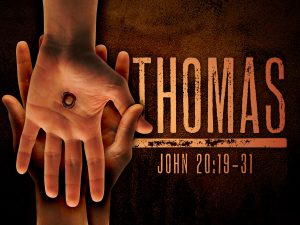
The incident is recorded for us in John 20. The previous verses record Jesus appearing to Mary Magdelene at the garden tomb. John and Peter were there at the Tomb but they did not see Jesus. Mary did. So it’s later that same day and the disciples are gathered together. Some probably believed or hoped to believe that Mary’s claim, that Jesus was alive, was true. Others probably thought she was crazy. John tells us – most described her report as an “idle tale”
Suddenly Jesus comes and stands among them. “Peace be with you.”
He senses that some of them are overwhelmed because don’t recognize him and some think they’re seeing a ghost. So he shows them his scars – where the nails had gone through his hands/wrists, and where the spear had pierced his side. It’s striking, isn’t it, that the Risen Christ still bears the scars? – a reminder, I suspect, for us all of his eternal sacrifice.
He then commissions them – “As the Father has sent me, so I send you . . . Go, preach & live the Good News air jordan 23 howard university pe!” He blesses them with the gift of the Holy Spirit to empower them for their mission.
This was an encounter the disciples would never forget. It changed their lives.
It changed the course of history. But Thomas missed it. He wasn’t there with them. Perhaps he was simply stunned and paralyzed from Good Friday and just needed to be alone. But of all the times to miss a meeting!
To the disciples’ credit, they go looking for Thomas. They don’t give up on him. They tell him the incredible news that Jesus is alive! The news hits him as too good to be true – “unless I see for myself – unless I see the mark of the nails and place my hand in his side, I will not believe.”
This is where Thomas gets his nickname from. He doesn’t believe at first.
He has his doubts. He wants to know for sure. This is also where the comparison to Bill Buckner breaks down. Because Thomas hasn’t committed an error here! Thomas hasn’t made a mistake here by doubting and wanting to know for sure. The story is not told that way in John 20. The disciples don’t scold him. Neither does Jesus. The Bible never shames him for doubting. In fact travis scott air jordan 1 retro low og black olive release date fall 2024, the Bible never calls him “Doubting Thomas.”
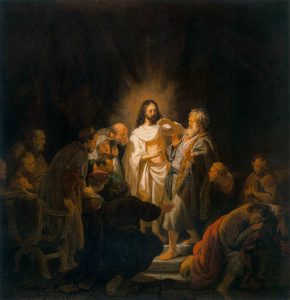
The Incredulity of Thomas, Rembrandt, 1634
The Thomas Society.
At one of my previous churches we had something called, “The Thomas Society.” It was simply a gathering of folks who had faith questions and wanted to ask their questions aloud and hear what others had to say about it.
We had some wonderful conversations; much like last Sunday. One funny thing happened – at the second meeting we had more than twice as many people as we had at the first meeting. And someone said, “The number of doubters is growing in the church. Is that a good thing?”
I’m not sure, but it was refreshing for people to sit around in a circle and hear that they’re not alone with their questions, and that other sincere, faithful churchgoers with good hearts and open minds still wrestled with doubts and questions – about God, about Christ, faith.
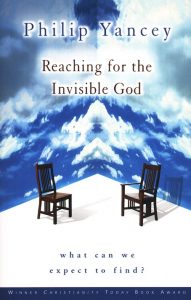
Philip Yancy wrote a great book entitled, Reaching for the Invisible God: What can we expect to find? It’s a book about faith and doubt, and how doubt is always a part of faith. That’s why it’s called faith! Yancy says, “Doubt always coexists with faith, for in the presence of certainty who would need faith at all?” “God’s invisibility guarantees that I will experience times of doubt.”
This side of heaven there will always be mystery when it comes to God. – our finite minds fully comprehending the Infinite One? – I don’t think so.
Flannery O’Connor said, “When we get our spiritual house in order, we’ll be dead.”
Barak Obama in a speech at Notre Dame University said this: “The ultimate irony of faith is that it necessarily Nike Vomero 18 Review: Bigger is Better - Nike Air Max 95 Cuban Link velvet brown UK 5 - Cheap Fenua-environnement Jordan Outlet admits doubt. It’s the belief in things not seen,” referring to Hebrews 11:1.
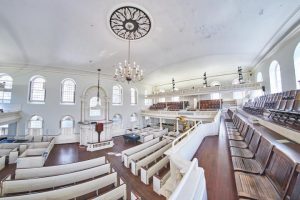
Church architecture.
You know, the Puritans built very bright meetinghouses. And they put the Pulpit & the Bible right in the center of it all. And they gathered each Sunday morning & evening to shed light and truth and certainty on the subject of God.
As a teacher of the faith, I like that. But throughout the centuries, Christians have also built darker sanctuaries, not just because they didn’t have fancy LED lighting. They built churches that intentionally had shadows, and with stained glass windows that let in some light, but not all. And many of these types of churches have always used a lot of rituals – they ring bells at certain times, the spread incense all around. And often these things are not explained much. The message is – there is Mystery here! The Mystery of God. Come, not to understand, but to embrace the Mystery and be embraced by it.
That resonates with me, too. Both types of churches express something at the heart of our faith – Truth & Light, Mystery & Shadows.
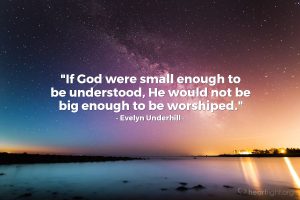
Here are some of my favorite quotes on today’s subject: Doubt & Faith
“We both believe and disbelieve a hundred times an hour GmarShops Marketplace , Air Jordan 1 Retro Low Og Neutral Grey , Jordan 12 Field Purple, which keeps Believing nimble.” – Emily Dickinson
“If you don’t have doubts you’re either kidding yourself or asleep. Doubts are the ants-in-the-pants of faith. They keep it alive and moving.” – Frederick Buechner
“Without somehow destroying me in the process, how could God reveal himself in a way that would leave no room for doubt? If there were no room for doubt, there would be no room for me.”
– Frederick Buechner
“Faith is better understood as a verb than as a noun, as a process than as a possession. It is an on-again-off-again rather than once-and-for-all. Faith is not being sure where you’re going but going anyway. A journey without maps. Tillich says that doubt isn’t the opposite of faith; it is an element of faith.” -Frederick Buechner
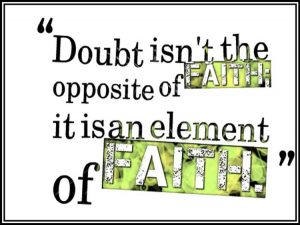
“If you find God with great ease, perhaps it is not God that you have found.”
– Thomas Merton
Belief is a wise wager. Granted that faith cannot be proved, what harm will come to you if you gamble on its truth and it proves false? If you gain, you gain all; if you lose, you lose nothing. Wager then, without hesitation, that God exists. – Blaise Pascal, 17th C. mathematician, scientist & theologian
Doubt always coexists with faith, for in the presence of certainty who would need faith at all?
– Philip Yancey
God’s invisibility guarantees I will experience times of doubt. Everyone dangles on a pendulum that swings from belief to unbelief, back to belief, and ends – where?”
–Philip Yancey, Reaching for the Invisible God
Doubt is the skeleton in the closet of faith, and I know no better way to treat a skeleton than to bring it into the open and expose it for what it is: not something to hide or fear, but a hard structure on which living tissue may grow. – Philip Yancey
Doubt is something almost every person experiences at some point, yet something that the church does not always handle well . . . the Bible includes so many examples of doubt. Evidently God has more tolerance of doubt than most churches. I want to encourage those who doubt, and also encourage the church to be a place that rewards rather than punishes honesty.” – Philip Yancey
************************************
Yancey is right, of course. In the scriptures, doubt is not a skeleton to be kept in the closet of faith, doubt is brought out into the open and we see that it’s part of the faith experience, even in the Bible. “Lord, I believe. Help my unbelief.” a man said to Jesus. Perhaps the most honest prayer in all the scriptures. The books of Psalms, Job, Ecclesiastes, and Lamentations are all filled with expressions of human doubt. – and they still put those books in the Bible.
Yancy points out – “Modern psychology teaches that since you can’t really eliminate your feelings you might as well go ahead and express them openly, and the Bible seems to agree.”
Church History is filled with Saints, great men and women of faith, who openly acknowledged their doubts.
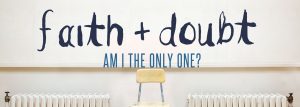
Martin Luther battled depression and doubt. “For more than a week, Christ was wholly lost. I was shaken by desperation and blasphemy against God.”
The Puritan preacher Richard Baxter once wrote that his faith rested on “probabilities instead of full undoubted certainties.” – A Puritan wrote that!
The famous Puritan Increase Mather wrote entries into his diaries such as this one: “Greatly attacked by temptations to atheism.”
You probably read that Mother Teresa of Calcutta spent many years struggling in her faith. Her dark times of doubt were very persistent and more the norm for her than the spiritual highs she experienced as a young believer.
D.L. Moody was the Billy Graham of the 1800s. His membership to the Park Street church in Boston was held up because his beliefs seemed so uncertain. They needed a Thomas Society at that church!
I want to close by calling to your attention to one of the Patriarchs of the Israelites, Jacob.
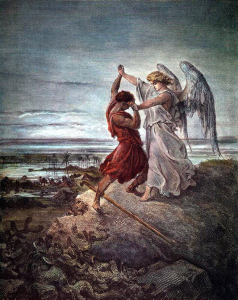
In Genesis 32, there’s a story about Jacob wrestling with some unknown person/spiritual being throughout the entire night – not in the light but in the dark they wrestle. Jacob is able to hold his own. He doesn’t totally win, but he doesn’t lose either, he doesn’t get destroyed.
He asks the man to bless him, and he gets his wish. The blessing comes with a name change. “You shall no longer be called Jacob, but rather ‘Israel,’ for you have wrestled with God and humans and prevailed.”
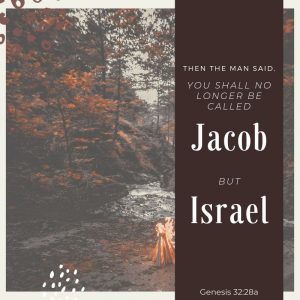
Here’s the point – Jacob gets a new name, Israel. That name stuck, didn’t it?
Do you know what the name “Israel” means? – “the one who wrestles with God”
So God’s chosen people are called “Those who wrestle with God.”
According to the Bible, part of being a person of faith is struggling, doubting, believing, questioning, wrestling. I find that to be good news, don’t you?
Faith, doubt, questioning, & wrestling.
These are the things of our religion, this side of heaven.
It was that way with the Israelites of old.
It was that way that first Easter.
And it’s that way with us.
And that’s okay, because this journey that we’re on – it’s a journey of faith.
Think about it.
Let’s pray about it.
Loving God, God of light and God of the shadows, God of wonder and mystery, thank you that just as Jesus accepted Thomas that day, you accept us this day, just as we are. Help us to be an honest people, honest with our doubts and questions, that by sharing them with one another and even with you we might gain understanding and grace. And help us in those times where we can’t find the answers, to at least find you, for that is what matters most. In Christ’s holy name we pray. Amen.
